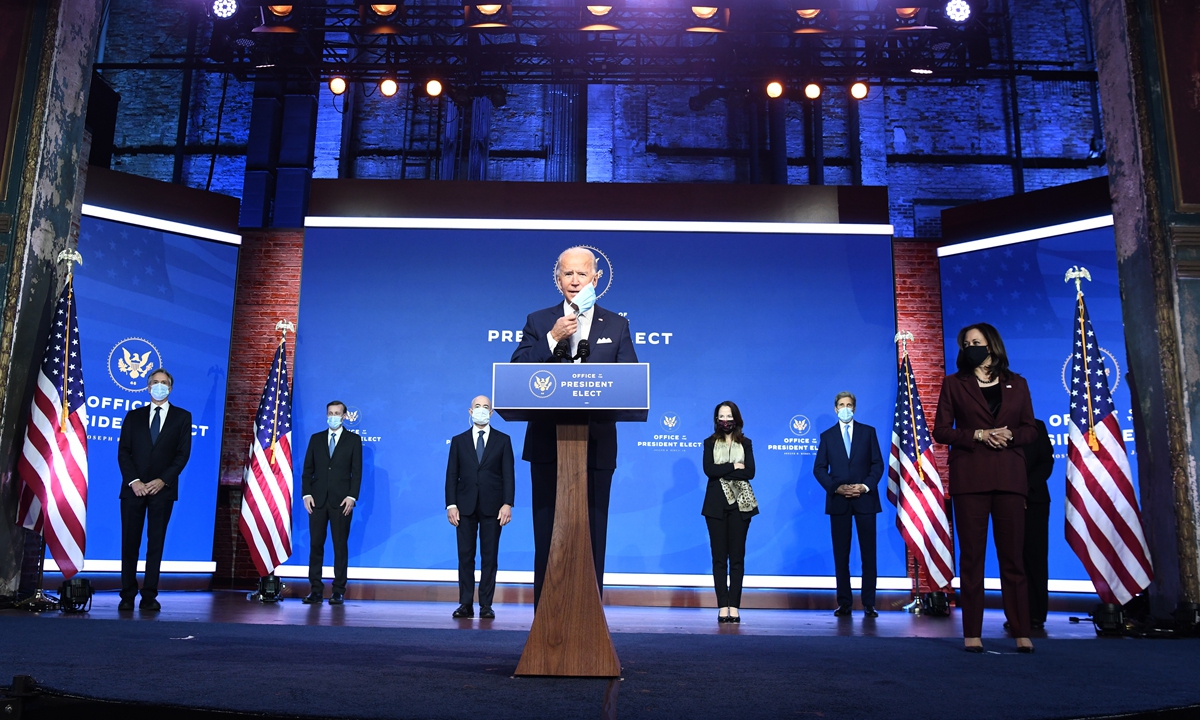Discarding illusion, Chinese view US as it is

US President-elect Joe Biden speaks during a cabinet announcement event in Wilmington, Delaware. Biden introduced a seasoned national security team he said was prepared to resume US leadership in the world after the departure of President Donald Trump. Photo: AFP
US president-elect Joe Biden is waiting for the Senate to confirm his advisors and cabinet nominees - particularly those involved in key positions. Packed with diplomatic and security elites who are familiar with China, the new cabinet has an unprecedented understanding of China.
The secretary of state nominee Antony Blinken is a professional diplomat who has dealt with many Chinese officials. Treasury nominee Janet Yellen, former chair of the Federal Reserve, is familiar with many senior Chinese financial officials.
Jake Sullivan, incoming national security advisor, once served as the director of policy planning at the US Department of State. He travelled with then US secretary of state Hillary Clinton to 112 countries. Sullivan also paid a low-key visit to the island of Taiwan as part of a think tank delegation in 2018.
John Kerry, Biden's pick for climate envoy, was once secretary of state and visited China many times. Trade representative nominee Katherine Tai is a Chinese-American who taught English for two years in the Guangzhou-based Sun Yat-sen University. She once served as Chief Counsel for China Trade Enforcement.
Kurt Campbell and Laura Rosenberger, Biden's picks for senior coordinator for Indo-Pacific policy and senior director for China at the National Security Council, both have rich experience in dealing with China.
Obviously, the configuration of Biden's cabinet is specially designed to deal with China's rise. At least we can say, when Biden made the choices, one important yardstick was whether the nominees understand and are good at dealing with China.
In China, there are many people like me who were filled with expectations toward Biden's China policy. But after reading his article entitled "Why America Must Lead Again" published on the Foreign Affairs in early 2020, I feel that future China-US ties will still face a lot of challenges.
Over the past four years, the US has achieved next to nothing from its tough stance against China. The trade war has not reduced US trade deficit with China like some had hoped. Washington wanted to launch a new cold war, yet failed to win support even from its closest allies. Its efforts to crack down on China's high-tech development have also been a failure.
In the past four years, China has fought back without losing its composure. China-US relations have worsened, but things are not completely out of control. When China was provoked, it showed vigor and strength in its counterattacks.
In contrast, the Trump administration has been acting like a paper tiger - it may seem outwardly aggressive, yet in fact inwardly weak. As the COVID-19 pandemic roars across the US, the whole world can see how desperate and embarrassed the Trump administration is.
Biden should draw a lesson and turn the table of the China-US relationship. However, I am still concerned. There is a saying in the Chinese business field, "The closer one is with others, the easier he or she could cheat them out of their money.''
As the new US administration is more familiar with China, will it be tougher on China?
Another point to remember is that Democrats are traditionally more inclined to view their opponents ideologically, more willing to provoke other countries with human rights issues, such as the Arab Spring of 2011. When the Democrats were in power, China-US relations often encountered adverse challenges, such as the US bombing of the Chinese embassy in Belgrade, Yugoslavia in 1999 during the Clinton administration and the South China Sea arbitration in 2016 during the Obama presidency.
From this perspective, China is right to have good intentions after Biden takes office, but with no illusions that external pressure will be lighter than it was under President Trump.
The Chinese people have ridden out a great deal of challenges. Trump's containment of China has served as an unexpected ideological and political lesson, which has educated the Chinese people more effectively than any teachers to face up to the cruelty of the international geopolitics and abandon their wishful thinking about the US.
In the past, most Chinese imagined the US to be too good; too perfect. But now the Chinese view the US the way it is: a possibly vicious, pretentious, and sometimes friendly adversary.
The author is professor and executive dean of Chongyang Institute for Financial Studies at Renmin University of China. wangwen2013@ruc.edu.cn



